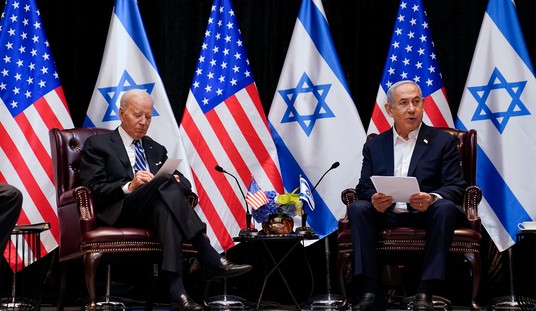
(Image courtesy of the White House)
Today it is my sad duty to report to you the death of the Pax Americana. This isn’t shocking news, as though the Pax had died unexpectedly in a car accident. No, this has been a long and lingering death — but the end now has come.
First comes John Schindler’s analysis of recent events in Syria — what he calls “Obama’s Collapsing War on the Islamic State.”
Read:
The forces Mr. Putin has just deployed to Syria are impressive, veteran special operators backed by a wing of fighters and ground attack jets that are expected to commence air strikes on Assad’s foes soon. They are backed by air defense units, which is puzzling since the Islamic State has no air force, indicating that the Kremlin’s true intent in Syria has little to do with the stated aim of fighting terrorism and is really about propping up Russia’s longtime client in Damascus.
The White House is left planning “deconfliction” with Moscow—which is diplomatic language for entreating Russians, who now dominate Syrian airspace, not to shoot down American drones, which provide the lion’s share of our intelligence on the Islamic State. The recent meeting on Syrian developments between Mr. Putin and Israeli Prime Minister Binyamin Netanyahu, who clearly finds dealing with the Russian strongman preferable to parleying with President Obama, indicates where power is flowing in today’s Middle East.
Putin isn’t merely protecting his Syrian clients; he’s also making nice with American allies Obama has turned his back on. ISIS has helped to draw Israel, Saudi Arabia, and Egypt closer than they’ve ever been — but Putin might just keep them that way. Add Moscow’s Iranian allies to the mix, and Russia could very well have a stronger position in the Middle East than the U.S. has ever enjoyed.
And think of all the goodwill Putin – yes, Putin — will earn with Moslems and Christians alike for being the only world leader with stones enough to take on ISIS.
Now travel with me north from Syria, across Turkey and the Black Sea, and into war-torn Ukraine — which Eerik-Niiles Kross and Molly K. McKew argue is a part of the same effort Putin has undertaken in Syria:
Despite what Vladimir Putin is saying, the United States still staunchly refuses to believe Russia is engaged in a new Cold War—and that the U.S. is losing. But Russia aggressively pushes its own narrative where U.S. leadership is absent. Russian Foreign Minister Sergei Lavrov seems to be everywhere in recent weeks, speaking several times with his US counterpart and others in the region, selling Russia as a partner for peace and stability when the West is faced with crisis.
Experts from the left and right alike warn that cooperation with Russia on Syria can have potentially disastrous consequences for the U.S., but too many Americans still don’t understand how closely linked these two headline conflicts are, and American policy has yet to confront the reality that Syria and Ukraine are part of the same mission for Russia—the destruction of the post-WWII architecture of the West.
Tying things back to Syria, Kross and McKew say that Putin’s overtures to the West for an ad hoc anti-ISIS alliance is “little more than a well-constructed trap for the White House and for Europe.” It’s a trap President Obama seems eager to jump into, as you’ll see on the next page.
MOSCOW (AP) — Kremlin spokesman: #Russia president Putin to meet #US president Obama on Monday.
— Matt Lee (@APDiploWriter) September 24, 2015
Do you wonder what Obama will lose or give away to Putin this time? Assuming Putin actually does plan to use an attack on one or more of the Baltic States as a means of destroying NATO, there might not be that much left for Obama to give away. Or Putin may choose the seemingly more modest choice of rendering NATO helpless as he gains control of the flow of Middle East refugees like a rusty spigot.
Meanwhile, on the other side of the world, Obama’s “pivot to Asia” has proven to be as meaningless as his “red line” in Syria. The following item just showed up in my feed as further evidence of China’s long game of good cop/bad cop:
China said on Thursday it will host defence ministers from the Association of South East Asian Nations (ASEAN) next month, amid tension between some of its members and China over the disputed South China Sea.
The Oct. 15-16 informal summit will take place in Beijing and China has invited the defence ministers of all 10 members, Chinese Defence Ministry spokesman Wu Qian told a regular monthly news briefing.
Chinese Defence Minister Chang Wanquan will have a “deep exchange of views” with participants, he added, without elaborating.
China has overlapping claims with Vietnam, the Philippines, Malaysia, Taiwan and Brunei in the South China Sea, through which US$5 trillion in ship-borne trade passes every year.
China the Expansionist Power continues work on a string of military islands in the South China Sea, perhaps displacing the ever-shrinking United States Navy. But China the Diplomatic Power is bringing its Pacific neighbors together, perhaps to sell them on the idea of protecting their mutual trade routes “together” as American power recedes.
And which major Pacific nation isn’t a member of ASEAN? Japan, of course — the staunch American ally which has increasingly been taking defense matters and decisions into its own hands.
Beijing is attempting a difficult maneuver. As a rising power in the middle of Asia, China’s smaller neighbors’ natural tendency would be to gather themselves under the American defense umbrella. But if there’s even a hint of daylight beginning to show between Tokyo and Washington, Beijing might just be able to convince their fellow ASEAN members that acquiescence to Chinese power is in their best interests.
Assuming Obama ever does complete his pivot to Asia, he may find there’s no one there to greet him but his selfie stick.
We seem to be finished in the Middle East, or close to it. Russia is getting a grip on us by the short ones in Europe. And China might finally have found the formula for eclipsing American power in the Asia-Pacific region without having to risk a shooting war.
Pax Americana lived a long and prosperous life, but its children squandered their inheritance. It may take a generation or longer of difficult and dangerous work before we can restore what was has been lost.









Join the conversation as a VIP Member